For our tour description, itinerary,
past triplists, dates, fees, and more, please VISIT OUR TOUR PAGE.
See this triplist in printable PDF format with media only on
page 1.
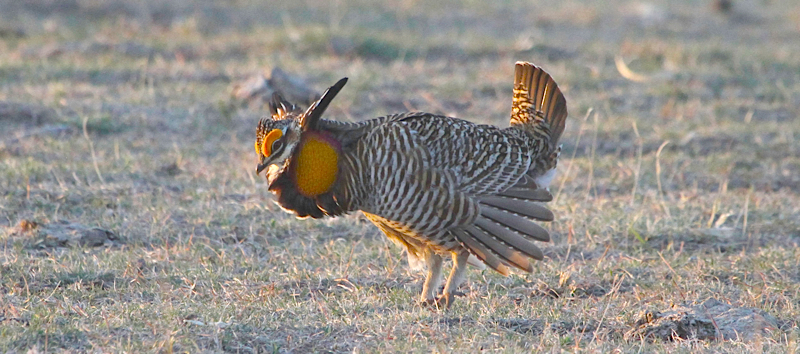
Dancing at dawn, a
male Greater Prairie-Chicken wows our group with an
incredible performance at the Bledsoe lek. If he impresses
the other chickens as much as he impressed us, he has a
great chance of mating! (Photo by guide Chris Benesh)
This year's first Colorado Grouse tour was a great success.
We were really fortunate with the weather, being able to get
to the places that we wanted to go and see most of what we
wanted to see. It was clear to us that Colorado was
experiencing a pretty significant drought this year; compared
with last year, there was a great deal less snowpack, and
reservoirs were well below capacity.
Colorado is quite a diverse destination. In order to see the
grouse and grouse-like birds, we had to cover some ground. In
fact, we covered just shy of 2400 miles - that's a lot of
Colorado! In doing so, however, we got a fun appreciation of
just how varied and beautiful things are there.
It's always hard to pick favorites, but ask we did, and you
all came up with some deserving choices. The runaway winner
this year was the Greater Sage-Grouse seen northeast of
Walden. The scenery there is splendid, and we were situated
right at the end of the lek, providing for a wonderful display
experience. The pair of White-tailed Ptarmigan received the
second highest vote count, and no doubt would have taken top
honors were it not for the fact that some stayed back at the
trailhead to avoid steep, icy conditions on the trail.
Brown-capped Rosy-Finch was the next biggest vote getter, and
it was one that kept us in suspense for most of the trip. The
lack of snow meant that most were already back on their high,
barren, alpine breeding habitat. Thankfully, the feeders in
Silverthorne came through for us at the end.
Greater Prairie-Chicken got two votes as well, as it was
indeed a wonderful show to witness. No doubt if we had allowed
for more than a pick-3, this would have gotten more votes. And
the plain and perky Juniper Titmouse snuck in with a couple of
votes, in part for its novelty and part for its animated self.
Barrow's Goldeneye was the last multi-vote getter. Again,
heightened suspense over whether we would track this one down
paid off in the end with nice studies at Windy Gap Reservoir.
Two more grouse made it on to the favorites list, too: the
female Dusky Grouse (number 600 for Jackie), and the
Sharp-tailed Grouse. Two jays made the list, Steller's and
Pinyon, the Pinyon Jay sightings were especially fantastic.
Also in the blue vein was Mountain Bluebird, which is a
wonderful shade of blue. Red was represented by Cinnamon Teal
and Pine Grosbeak. And rounding out the list were
Black-throated Sparrow, Pygmy Nuthatch, and Burrowing Owl.
Thanks to all of you for joining Terry and me on our
exploration of Colorado. It was a pleasure sharing the antics
of grouse with you and hearing all of your stories. Until the
next adventure, all the best!
--Chris
KEYS FOR THIS LIST
One of the following keys may be shown in brackets for
individual species as appropriate: * = heard only, I =
introduced, E = endemic, N = nesting, a = austral migrant, b =
boreal migrant
Anatidae (Ducks, Geese, and Waterfowl)
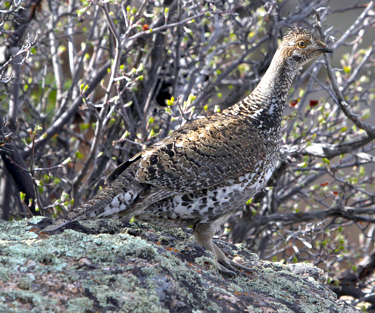
A lovely portrait
of Jackie's 600th ABA area bird- a female Dusky Grouse at
the Black Canyon. (Photo by guide Chris Benesh)
CANADA GOOSE (Branta canadensis)
GADWALL (Anas strepera)
AMERICAN WIGEON
(Anas americana)
MALLARD (Anas platyrhynchos)
CINNAMON TEAL
(Anas cyanoptera)
NORTHERN SHOVELER
(Anas clypeata)
NORTHERN PINTAIL
(Anas acuta)
GREEN-WINGED TEAL
(AMERICAN) (Anas crecca
carolinensis)
REDHEAD (Aythya americana)
RING-NECKED DUCK
(Aythya collaris)
LESSER SCAUP
(Aythya affinis)
BUFFLEHEAD
(Bucephala albeola)
COMMON GOLDENEYE
(Bucephala clangula)
BARROW'S GOLDENEYE
(Bucephala islandica)
HOODED MERGANSER
(Lophodytes cucullatus)
COMMON MERGANSER
(Mergus merganser)
RUDDY DUCK
(Oxyura jamaicensis)
Odontophoridae (New World Quail)
SCALED QUAIL (Callipepla squamata)
GAMBEL'S QUAIL
(Callipepla gambelii)
Phasianidae (Pheasants, Grouse, and
Allies)
RING-NECKED PHEASANT (Phasianus colchicus) [I]
GREATER
SAGE-GROUSE (Centrocercus
urophasianus)
GUNNISON
SAGE-GROUSE (Centrocercus
minimus)
WHITE-TAILED
PTARMIGAN (Lagopus leucura)
DUSKY GROUSE
(Dendragapus obscurus)
SHARP-TAILED
GROUSE (Tympanuchus
phasianellus)
GREATER
PRAIRIE-CHICKEN (Tympanuchus
cupido)
LESSER
PRAIRIE-CHICKEN (Tympanuchus
pallidicinctus)
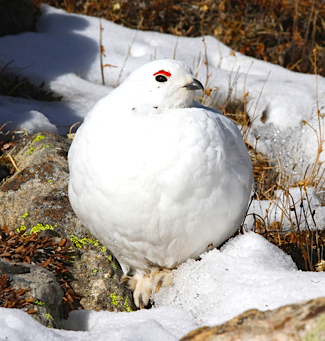
A pair of
immaculate White-tailed Ptarmigan was the reward for a
hike up the steep and icy trails at Loveland Pass. (Photo
by guide Chris Benesh)
WILD TURKEY (Meleagris gallopavo)
Gaviidae (Loons)
COMMON LOON (Gavia immer)
Podicipedidae (Grebes)
PIED-BILLED GREBE (Podilymbus podiceps)
EARED GREBE
(Podiceps nigricollis)
WESTERN GREBE
(Aechmophorus occidentalis)
CLARK'S GREBE
(Aechmophorus clarkii)
Phalacrocoracidae (Cormorants and Shags)
DOUBLE-CRESTED CORMORANT (Phalacrocorax auritus)
Pelecanidae (Pelicans)
AMERICAN WHITE PELICAN (Pelecanus erythrorhynchos)
Ardeidae (Herons, Egrets, and Bitterns)
GREAT BLUE HERON (Ardea herodias)
Threskiornithidae (Ibises and Spoonbills)
WHITE-FACED IBIS (Plegadis chihi)
Cathartidae (New World Vultures)
TURKEY VULTURE (Cathartes aura)
Pandionidae (Osprey)
OSPREY (Pandion
haliaetus)
Accipitridae (Hawks, Eagles, and Kites)
BALD EAGLE (Haliaeetus
leucocephalus)
NORTHERN HARRIER
(Circus cyaneus)
SHARP-SHINNED HAWK
(Accipiter striatus)
COOPER'S HAWK
(Accipiter cooperii)
SWAINSON'S HAWK
(Buteo swainsoni)
RED-TAILED HAWK
(Buteo jamaicensis)
FERRUGINOUS HAWK
(Buteo regalis)
ROUGH-LEGGED HAWK
(Buteo lagopus)
GOLDEN EAGLE
(Aquila chrysaetos)
Falconidae (Falcons and Caracaras)
AMERICAN KESTREL (Falco sparverius)
PEREGRINE FALCON
(Falco peregrinus)
PRAIRIE FALCON
(Falco mexicanus)
Rallidae (Rails, Gallinules, and Coots)
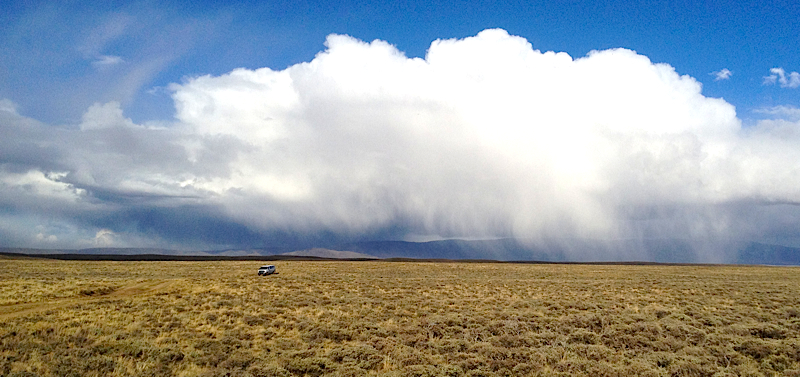
Big skies and
beautiful scenery in the grasslands near Walden. (Photo by
guide Chris Benesh)
AMERICAN COOT (Fulica americana)
Gruidae (Cranes)
SANDHILL CRANE (Grus canadensis)
Charadriidae (Plovers and Lapwings)
KILLDEER (Charadrius
vociferus)
MOUNTAIN PLOVER
(Charadrius montanus)
Recurvirostridae (Stilts and Avocets)
AMERICAN AVOCET (Recurvirostra americana)
Scolopacidae (Sandpipers and Allies)
GREATER YELLOWLEGS (Tringa melanoleuca)
LESSER YELLOWLEGS
(Tringa flavipes)
LONG-BILLED CURLEW
(Numenius americanus)
WILSON'S SNIPE
(Gallinago delicata) [*]
Laridae (Gulls, Terns, and Skimmers)
BONAPARTE'S GULL (Chroicocephalus philadelphia)
FRANKLIN'S GULL
(Leucophaeus pipixcan)
RING-BILLED GULL
(Larus delawarensis)
CALIFORNIA GULL
(Larus californicus)
Columbidae (Pigeons and Doves)
ROCK PIGEON (Columba livia) [I]
BAND-TAILED PIGEON
(Patagioenas fasciata)
EURASIAN
COLLARED-DOVE (Streptopelia
decaocto) [I]
MOURNING DOVE
(Zenaida macroura)
Cuculidae (Cuckoos)
GREATER ROADRUNNER (Geococcyx californianus)
Strigidae (Owls)
EASTERN SCREECH-OWL (Megascops asio)
GREAT HORNED OWL
(Bubo virginianus)
BURROWING OWL
(Athene cunicularia)
Apodidae (Swifts)
WHITE-THROATED SWIFT (Aeronautes saxatalis)
Alcedinidae (Kingfishers)
BELTED KINGFISHER (Megaceryle alcyon)
Picidae (Woodpeckers)
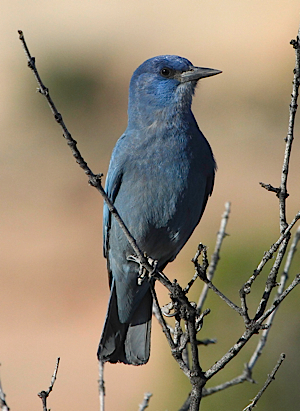
The social and
gregarious Pinyon Jay was a highlight of our visit to the
Colorado National Monument. (Photo by guide Chris Benesh)
WILLIAMSON'S SAPSUCKER (Sphyrapicus thyroideus)
RED-NAPED
SAPSUCKER (Sphyrapicus
nuchalis)
LADDER-BACKED
WOODPECKER (Picoides scalaris)
DOWNY WOODPECKER
(Picoides pubescens)
HAIRY WOODPECKER
(Picoides villosus)
NORTHERN FLICKER
(Colaptes auratus)
NORTHERN FLICKER
(RED-SHAFTED) (Colaptes
auratus cafer)
Tyrannidae (Tyrant Flycatchers)
EASTERN PHOEBE (Sayornis phoebe)
SAY'S PHOEBE
(Sayornis saya)
Laniidae (Shrikes)
LOGGERHEAD SHRIKE (Lanius ludovicianus)
Corvidae (Crows, Jays, and Magpies)
GRAY JAY (Perisoreus
canadensis)
PINYON JAY
(Gymnorhinus cyanocephalus)
STELLER'S JAY
(Cyanocitta stelleri)
BLUE JAY (Cyanocitta cristata)
WESTERN SCRUB-JAY
(WOODHOUSE'S) (Aphelocoma
californica woodhouseii)
BLACK-BILLED
MAGPIE (Pica hudsonia)
CLARK'S NUTCRACKER
(Nucifraga columbiana)
AMERICAN CROW
(Corvus brachyrhynchos)
COMMON RAVEN
(Corvus corax)
Alaudidae (Larks)
HORNED LARK (Eremophila alpestris)
Hirundinidae (Swallows)
TREE SWALLOW (Tachycineta bicolor)
VIOLET-GREEN
SWALLOW (Tachycineta
thalassina)
BARN SWALLOW
(Hirundo rustica)
Paridae (Chickadees and Tits)
BLACK-CAPPED CHICKADEE (Poecile atricapillus)
MOUNTAIN CHICKADEE
(Poecile gambeli)
JUNIPER TITMOUSE
(Baeolophus ridgwayi)
Sittidae (Nuthatches)
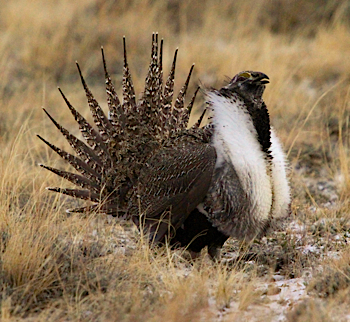
The fantastic
displays of Greater Sage-Grouse on the lek at Walden made
this the overall favorite bird of the trip. (Photo by
guide Chris Benesh)
RED-BREASTED NUTHATCH (Sitta canadensis)
WHITE-BREASTED
NUTHATCH (Sitta carolinensis)
PYGMY NUTHATCH
(Sitta pygmaea)
Troglodytidae (Wrens)
ROCK WREN (Salpinctes
obsoletus)
CANYON WREN
(Catherpes mexicanus)
BEWICK'S WREN
(Thryomanes bewickii)
Cinclidae (Dippers)
AMERICAN DIPPER (Cinclus mexicanus)
Regulidae (Kinglets)
RUBY-CROWNED KINGLET (Regulus calendula)
Turdidae (Thrushes and Allies)
EASTERN BLUEBIRD (Sialia sialis)
WESTERN BLUEBIRD
(Sialia mexicana)
MOUNTAIN BLUEBIRD
(Sialia currucoides)
TOWNSEND'S
SOLITAIRE (Myadestes
townsendi)
AMERICAN ROBIN
(Turdus migratorius)
Mimidae (Mockingbirds and Thrashers)
SAGE THRASHER (Oreoscoptes montanus)
CURVE-BILLED
THRASHER (EASTERN) (Toxostoma
curvirostre oberholseri)
Sturnidae (Starlings)
EUROPEAN STARLING (Sturnus vulgaris) [I]
Calcariidae (Longspurs and Snow Buntings)
MCCOWN'S LONGSPUR (Rhynchophanes mccownii)
Parulidae (New World Warblers)
YELLOW-RUMPED WARBLER (AUDUBON'S)
(Setophaga coronata auduboni) [*]
Emberizidae (Buntings, Sparrows and
Allies)
SPOTTED TOWHEE (Pipilo maculatus)
CANYON TOWHEE
(Melozone fusca)
VESPER SPARROW
(Pooecetes gramineus)
BLACK-THROATED
SPARROW (Amphispiza bilineata)
LARK BUNTING
(Calamospiza melanocorys)
FOX SPARROW
(SLATE-COLORED) (Passerella
iliaca schistacea)
SONG SPARROW
(Melospiza melodia)
WHITE-CROWNED
SPARROW (GAMBEL'S) (Zonotrichia
leucophrys gambelii)
DARK-EYED JUNCO
(GRAY-HEADED) (Junco hyemalis
caniceps)
Icteridae (Troupials and Allies)
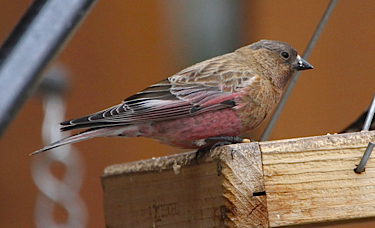
The early spring
and lack of snow meant that rosy-finches were back up high
on their breeding grounds and scarce at the lower
elevations. Luckily, the feeders at Silverthorne still had
a couple of Brown-capped Rosy-Finches dropping by and we
had super looks. (Photo by guide Chris Benesh)
RED-WINGED BLACKBIRD (Agelaius phoeniceus)
WESTERN MEADOWLARK
(Sturnella neglecta)
YELLOW-HEADED
BLACKBIRD (Xanthocephalus
xanthocephalus)
BREWER'S BLACKBIRD
(Euphagus cyanocephalus)
COMMON GRACKLE
(BRONZED) (Quiscalus quiscula
versicolor)
GREAT-TAILED
GRACKLE (Quiscalus mexicanus)
BROWN-HEADED
COWBIRD (Molothrus ater)
Fringillidae (Siskins, Crossbills, and
Allies)
BROWN-CAPPED ROSY-FINCH (Leucosticte australis)
PINE GROSBEAK
(Pinicola enucleator)
CASSIN'S FINCH
(Carpodacus cassinii)
HOUSE FINCH
(Carpodacus mexicanus)
RED CROSSBILL
(Loxia curvirostra)
PINE SISKIN
(Spinus pinus)
AMERICAN GOLDFINCH
(Spinus tristis)
EVENING GROSBEAK
(Coccothraustes vespertinus brooksi)
Passeridae (Old World Sparrows)
HOUSE SPARROW (Passer domesticus) [I]
PIKA (Ochotona princeps)
NUTTALL'S
(MOUNTAIN) COTTONTAIL (Sylvilagus
nuttalli)
DESERT COTTONTAIL
(Sylvilagus audubonii)
WHITE-TAILED
JACKRABBIT (Lepus townsendi)
BLACK-TAILED
JACKRABBIT (Lepus
californicus)
LEAST CHIPMUNK
(Tamias minimus)
COLORADO CHIPMUNK
(Tamias quadrivittatus)
YELLOW-BELLIED
MARMOT (Marmota flaviventris)
WHITE-TAILED
ANTELOPE SQUIRREL (Ammospermophilus
leucurus)
WYOMING GROUND
SQUIRREL (Spermophilus
elegans)
THIRTEEN-LINED
GROUND SQUIRREL (Spermophilus
tridecemlineatus)
ROCK SQUIRREL
(Spermophilus variegatus)
GOLDEN-MANTLED
GROUND SQUIRREL (Spermophilus
lateralis)
BLACK-TAILED
PRAIRIE DOG (Cynomys
ludovicianus)
WHITE-TAILED
PRAIRIE DOG (Cynomys leucurus)
GUNNISON PRAIRIE
DOG (Cynomys gunnisoni)
FOX SQUIRREL
(Sciurus niger)
RED SQUIRREL
(Tamiasciurus hudsonicus)
ORD'S KANGAROO RAT
(Dipodomys ordii)
MUSKRAT (Ondatra zibethica)
RED FOX (Vulpes vulpes)
SHORT-TAILED
WEASEL (STOAT) (Mustela
erminea)
AMERICAN BADGER
(Taxidea taxus)
STRIPED SKUNK
(Mephitis mephitis)
ELK (Cervus canadensis)
MULE DEER (Odocoileus hemionus)
WHITE-TAILED DEER
(Odocoileus virginianus)
PRONGHORN (Antilocapra americana)
BIGHORN SHEEP
(Ovis canadensis)
Totals for the tour: 143 bird taxa and 29 mammal taxa







